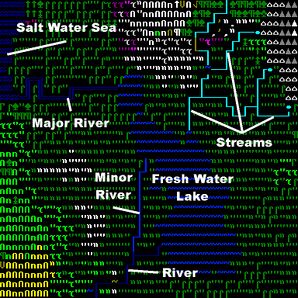- v50 information can now be added to pages in the main namespace. v0.47 information can still be found in the DF2014 namespace. See here for more details on the new versioning policy.
- Use this page to report any issues related to the migration.
Difference between revisions of "40d:River"
(Style; we don't need struck-out sections - that's what the history is for!) |
|||
| Line 19: | Line 19: | ||
== Underground Rivers == | == Underground Rivers == | ||
| − | An underground river is, obviously, a river found [[underground]]. They | + | An underground river is, obviously, a river found [[underground]]. They can be located on the embarkation map through use of the [[site finder]]. |
| − | If | + | If your site has a cave river, [[tower-cap]]s will start sprouting in [[soil]] or [[mud]]dy caverns. You can use it as the basis of an [[underground forest]] operation. |
It is also possible to find cave rivers or pools which are actually visible from the surface - you may even see a few [[tower-cap]]s growing on the surface. This may be rather rare, however, and cannot be spotted from site-selection. (You can tell it's a cave river/pool because of the frogmen or what-have-you in it) | It is also possible to find cave rivers or pools which are actually visible from the surface - you may even see a few [[tower-cap]]s growing on the surface. This may be rather rare, however, and cannot be spotted from site-selection. (You can tell it's a cave river/pool because of the frogmen or what-have-you in it) | ||
Revision as of 02:57, 12 August 2008
Surface Rivers
Rivers are found on the surface of world maps. They vary in width and depth, some being more wide and some being more deep than others. They often flow through deep canyons or just across the flat surface of a level. On levels with cliffs, waterfalls may be found.
Major rivers, Minor rivers, Streams and Brooks
On the surface of the world you can find four different types of rivers.
- Major Rivers are distinguished by a "=" as opposed to a "-". Some worlds have no Major Rivers so they can be considered quite valuable. Usually they have minor river tributaries and can often feed large lakes. Major rivers are much wider than regular rivers. Besides this, the difference (if any) between major and minor rivers has yet to be discovered. However major rivers are believed to lower the fps.
- Minor Rivers are dark blue and usually have tributaries of brooks.
- Streams are light blue and often converge with other streams, and have some tributaries of brooks.
- Brooks are not visible on the region map. They are the smallest flowing body of water that can be found ingame. Brooks have a special water designation, dwarves and other units are capable of walking through a brook. Brooks are very common, almost every tile around a stream or larger river will have a brook running through it.
Underground Rivers
An underground river is, obviously, a river found underground. They can be located on the embarkation map through use of the site finder.
If your site has a cave river, tower-caps will start sprouting in soil or muddy caverns. You can use it as the basis of an underground forest operation.
It is also possible to find cave rivers or pools which are actually visible from the surface - you may even see a few tower-caps growing on the surface. This may be rather rare, however, and cannot be spotted from site-selection. (You can tell it's a cave river/pool because of the frogmen or what-have-you in it)
Other Important Facts
- Rivers presumably contain an unlimited amount of water and cannot be drained. They can, however, be dammed if you can *temporarily* drain part of them to 1/7 or less for long enough to install floodgates. For some reason, rivers will not overflow floodgates which are blocking them. The water just... stops. This demonstrates one way to drain and dam a river: [1]. Another way to dam a river is to direct a lava flow into it, producing obsidian in the squares where it encounters water.
- Rivers often contain an abundance of fish, including highly dangerous dwarf-killing fish such as carp, pike, longnose gar, etc.
- See water.
Worlds | |
|---|---|
Badlands · Desert · Flatland · Forest · Glacier · Lake · Marsh · Mountain · Murky pool · Ocean · River · Rocky wasteland · Sand desert · Swamp · Tundra |
